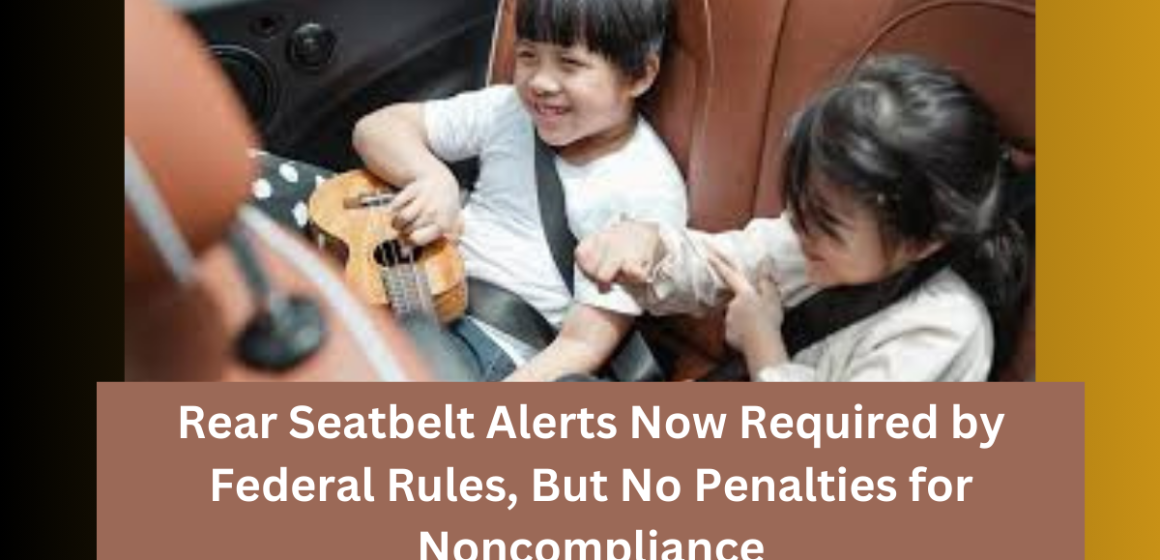This month, the National Highway Traffic Safety Administration (NHTSA) finalized a new rule requiring all new passenger vehicles to include visual and audible seatbelt warning systems for rear-seat passengers, alongside enhanced warnings for front-seat occupants. The new mandate seeks to tackle a significant safety concern: rear-seat passengers have historically shown lower seatbelt compliance rates compared to those in the front seats.
The NHTSA’s mandate will go into effect for front-seat warnings on September 1, 2026, and for rear-seat warnings on September 1, 2027. The goal is simple: reduce fatalities and injuries caused by not wearing seatbelts, particularly in the rear seats, where compliance has been notably low.
The Real-World Impact of Seatbelt Use
As an Arizona personal injury attorney with over 30 years of experience, I’ve witnessed firsthand the life-saving impact of seatbelt use. Wearing a seatbelt is a simple action, but it dramatically reduces the risk of injury or death in vehicle accidents. Despite widespread awareness, some individuals still neglect this crucial safety measure, leading to preventable tragedies.
Here are some compelling statistics:
- Seatbelts reduce the risk of death by 45% for front-seat passengers in cars and by 60% for those in SUVs, vans, and trucks.
- In 2022, 42,795 people died in motor vehicle crashes in the U.S., and nearly half of those victims were not wearing seatbelts.
- Rear-seat passengers are three times more likely to die in a crash if they are unbelted compared to those who buckle up.
These numbers underscore just how important seatbelt use is in preventing life-altering injuries and fatalities. The decision to wear a seatbelt is not just about personal safety—it’s about reducing the collective impact of car accidents on families, communities, and society.
Arizona Takes Steps, But Gaps in Safety Remain
Recently, Arizona made notable progress in promoting seatbelt safety by mandating that all front-seat occupants and children ages 8 to 15 must wear seatbelts in all seating positions. However, Arizona still lacks a statewide requirement for adult rear-seat passengers (ages 16 and over) to wear seatbelts. This means that, at present, adults riding in the back seat are not legally obligated to buckle up, though it is strongly recommended for their safety.
While the NHTSA’s new rule and Arizona’s current seatbelt requirements are certainly steps in the right direction, these measures still lack “teeth.” Under Arizona’s law, seatbelt violations are considered a secondary offense, meaning police officers can only issue a ticket if the driver is already pulled over for another violation. In contrast, Arizona made using a cell phone while driving a primary offense, meaning it can be ticketed on its own. Why should seatbelt violations be treated differently?
The Need for Stronger Enforcement
The path forward is clear. Arizona should follow the example set by other states and treat failure to buckle up as a primary offense for all passengers, regardless of where they are sitting. This simple change would encourage more people to buckle up, ultimately saving lives and reducing injuries.
Some might argue that enforcing seatbelt use infringes on personal freedom. However, the right to personal freedom must be balanced against the collective responsibility to protect lives. The minor inconvenience of wearing a seatbelt pales in comparison to the potential consequences of not doing so.
The Road Ahead
While Arizona’s recent legislative efforts are commendable, there is still room for improvement. We need to continue advocating for comprehensive seatbelt use laws that cover both front and rear-seat passengers, regardless of age or seating position. Additionally, supporting technological advancements in vehicle safety, like the new NHTSA rule requiring seatbelt warnings, is another step in the right direction.
Together, we can move toward a future where preventable injuries and deaths on our roads are rare. By making seatbelt use mandatory for all passengers and supporting enhanced enforcement, we can ensure that fewer families face the devastating consequences of accidents that could have been avoided with something as simple as buckling up.



Leave a Reply